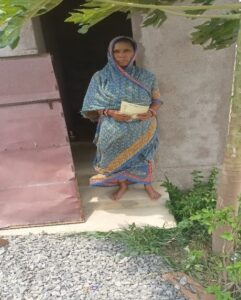
The pressure to build a safe sanitation system (toilet) can be triggered in various ways. Take the case of Shibaprasad Gaigouria, a 65-year-old marginal farmer and daily wage labourer, who resides in a village in Boudh District in Odisha with his wife Ranjita and their eight children. Facing daily challenges due to their frugal income, the family encountered a critical issue when their daughter Chumki got married with Satrughan Baag. After some days, when he visited the in-law’s home with his newly wed wife, her husband was not able to stay a single day there. The family was flabbergasted and at a loss of words because they could not understand why he wouldn’t stay for even a day despite being treated like a prince, since Indian homes traditionally lay out the best facilities for the son-in-law. The daughter kept asking him his reason for his unwillingness to stay in her house.
 After much cajling and persuasion she came too know that he was miffed that his in-laws did not have a properly constructed toilet in their home.
After much cajling and persuasion she came too know that he was miffed that his in-laws did not have a properly constructed toilet in their home.
After some time, even the daughter started making excuses to visit her ancestral home. The mother came to know that the daughter too was now used to defecating in a properly constructed safe sanitation system so she too did not want to face the ignominy of defecating in the open.
Determined to address this problem, Shibaprasad and Ranjita applied for a loan from Annapurna Microfinance Pvt. Ltd. Sonepur Branch. With the loan approved, they quickly set about to build a toilet in their home. The impact was transformative – not only did it improve their family’s quality of life, but it also highlighted the importance of sanitation for overall well-being.
The poignant story of Shibaprasad and Ranjita showcases how a small initiative can have a profound impact on a family’s health and happiness, inspiring others in the community to prioritize essential infrastructure for a better future.
